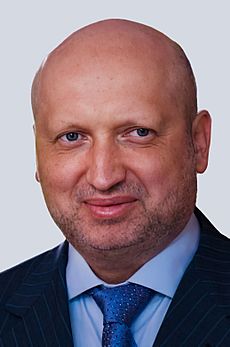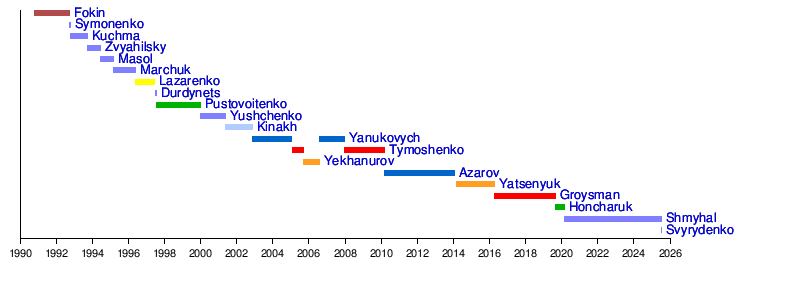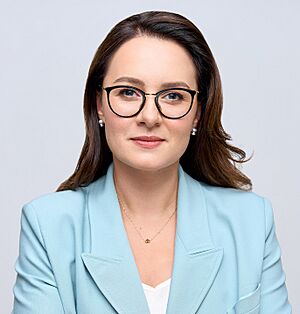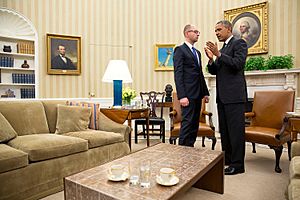Prime Minister of Ukraine facts for kids
Quick facts for kids Prime Minister of Ukraine |
|
|---|---|

|
|
| Style | Mdm Prime Minister (informal) Her Excellency (diplomatic) |
| Member of | Cabinet National Security and Defense Council |
| Seat | Government Building, Kyiv, Ukraine |
| Nominator | President of Ukraine |
| Appointer | Verkhovna Rada |
| Term length | Five years unless the Verkhovna Rada is dissolved sooner No term limits specified |
| Inaugural holder | Volodymyr Vynnychenko |
| Formation | 28 June 1917 (original) 25 March 1946 (Ukrainian SSR) 24 August 1991 (current form) |
| Deputy | First Deputy Prime Minister |
| Salary | ₴20,000 monthly |
| Website | KMU.gov.ua |
The prime minister of Ukraine (in Ukrainian: Прем'єр-міністр України) is the main leader of the government in Ukraine. Think of them as the head of the team that runs the country day-to-day. The prime minister leads the Cabinet of Ministers of Ukraine. This Cabinet is the highest group in charge of carrying out laws and managing the country.
This important role started after Ukraine became independent in 1991. Before that, during the Soviet era, the position was called the chairman of the Council of Ministers.
Yulia Tymoshenko was the first woman to become prime minister of Ukraine. Arseniy Yatsenyuk was the first prime minister from Western Ukraine.
The current prime minister is Yulia Svyrydenko. She was approved by the Verkhovna Rada (Ukraine's parliament) on July 17, 2025. She took over from Denys Shmyhal.
Contents
How is the Prime Minister Chosen?
The president chooses the prime minister. But this choice needs to be approved by the Verkhovna Rada, which is Ukraine's parliament. The parliament gives its approval if more than half of its members vote for the person the president suggests.
Getting this approval is a big deal. For example, Yulia Tymoshenko received 373 votes when she became prime minister in 2005. This was the highest number of votes ever given to a prime minister candidate. Other prime ministers like Arseniy Yatsenyuk, Vitold Fokin, and Leonid Kuchma also received many votes.
Before the vote, members of parliament talk with the candidate for several days. They ask questions and learn about their plans. Sometimes, a candidate might not get enough votes the first time. For instance, in 1999, Valeriy Pustovoitenko almost got re-approved but missed by just three votes.
Since 2004, the president's choice for prime minister has been more limited. The president usually has to nominate someone suggested by the group of parties that form a majority in parliament. This makes sure the prime minister has strong support from the lawmakers.
A prime minister, like other government members, cannot also be a member of parliament at the same time.
What Does the Prime Minister Do?
The prime minister leads the Cabinet of Ministers. This Cabinet is the main group that runs the country. The prime minister signs the official orders that the Cabinet passes.
The prime minister suggests people for most government minister jobs to the parliament. However, the president suggests the candidates for the minister of foreign affairs and the minister of defence. The prime minister can also suggest people to the president to lead regional areas.
The prime minister also signs off on laws and orders made by the president. This means they are responsible for making sure these laws are put into action.
While in office, the prime minister is protected from legal actions. Their main office is in the Cabinet of Ministries building in central Kyiv. In 2013, the prime minister's monthly salary was about ₴33,980. This was much higher than the average salary in Ukraine.
Sometimes, people even write to the prime minister directly for help with their personal problems. In 2012, Prime Minister Azarov received many messages on his Facebook page asking for help.
Acting and Deputy Prime Ministers

If the prime minister is not available, the first vice-prime minister (also called the first deputy) takes charge of the Cabinet. Some first deputies, like Yukhym Zvyahilsky and Mykola Azarov, have served as acting prime minister for a long time.
Besides the first deputy, there are other vice-ministers. They help the prime minister and might be in charge of specific areas. These areas could be about farming, helping people, the economy, or regional issues.
Leaving the Job: Resignation or Dismissal
The prime minister, like other Cabinet members, can choose to resign. They do this by giving their resignation to the parliament. When the prime minister resigns, the entire Cabinet also steps down. Since 1996, only two prime ministers, Pavlo Lazarenko and Mykola Azarov, have left their jobs this way.
Prime ministers do not have a set time limit for how long they can serve. They usually stay in office until the parliament's term ends, or until they resign or are dismissed.
Before 2004, the president could usually dismiss the prime minister alone. But after a change in the constitution, only the parliament can dismiss the prime minister. This happens if the parliament votes that it no longer trusts the Cabinet. However, parliament cannot do this within one year of the Cabinet starting its work.
Who Has Been Prime Minister?
Since Ukraine became independent from the Soviet Union in 1991, there have been 19 prime ministers.
Yulia Svyrydenko is the current prime minister of Ukraine, starting on July 17, 2025.
Denys Shmyhal was the longest-serving prime minister. Other long-serving prime ministers include Mykola Azarov and Yulia Tymoshenko, both of whom served two times.
Tymoshenko was the first woman to hold the position of prime minister in Ukraine.
Timeline of Prime Ministers

How Many Votes Did They Get?
| N | Date | Prime minister | Origin | Political party | Parliament votes | % (of 450) |
|---|---|---|---|---|---|---|
| 1 | 14 November 1990 | Vitold Fokin | Zaporizhzhia Oblast | Independent | 332 | 73.8 |
| 2 | 13 October 1992 | Leonid Kuchma | Chernihiv Oblast | Independent | 316 | 70.2 |
| 3 | 16 June 1994 | Vitaliy Masol | Chernihiv Oblast | Independent | 199 | 44.2 |
| 4 | 6 March 1995 | Yevhen Marchuk | Kirovohrad Oblast | Social Democratic Party of Ukraine | ??? | ??? |
| 5 | 28 May 1996 | Pavlo Lazarenko | Dnipropetrovsk Oblast | Hromada | ??? | ??? |
| 6 | 16 July 1997 | Valeriy Pustovoitenko | Mykolaiv Oblast | People's Democratic Party | 226 | 50.2 |
| 7 | 22 December 1999 | Viktor Yushchenko | Sumy Oblast | Independent | 296 | 65.8 |
| 8 | 29 May 2001 | Anatoliy Kinakh | Moldavian SSR | Industrialists | 239 | 53.1 |
| 9 | 21 November 2002 | Viktor Yanukovych | Donetsk Oblast | Party of Regions | 234 | 52.0 |
| 10 | 4 February 2005 | Yulia Tymoshenko | Dnipropetrovsk Oblast | Batkivshchyna | 373 | 82.9 |
| 11 | 22 September 2005 | Yuri Yekhanurov | Russian SFSR | Our Ukraine | 289 | 64.2 |
| 12 | 4 August 2006 | Viktor Yanukovych | Donetsk Oblast | Party of Regions | 271 | 60.2 |
| 13 | 18 December 2007 | Yulia Tymoshenko | Dnipropetrovsk Oblast | Batkivshchyna | 226 | 50.2 |
| 14 | 11 March 2010 | Mykola Azarov | Russian SFSR | Party of Regions | 242 | 53.8 |
| 13 December 2012 | 252 | 56.0 | ||||
| 15 | 27 February 2014 | Arseniy Yatsenyuk | Chernivtsi Oblast | Batkivshchyna | 371 | 82.2 |
| 27 November 2014 | People's Front | 341 | 75.8 | |||
| 16 | 14 April 2016 | Volodymyr Groysman | Vinnytsia Oblast | Petro Poroshenko Bloc | 257 | 57.1 |
| 17 | 29 August 2019 | Oleksiy Honcharuk | Chernihiv Oblast | Servant of the People | 290 | 64.4 |
| 18 | 4 March 2020 | Denys Shmyhal | Lviv Oblast | Independent | 291 | 64.7 |
| 19 | 17 July 2025 | Yulia Svyrydenko | Chernihiv Oblast | Independent | 262 | 58.2 |
See also
 In Spanish: Primer ministro de Ucrania para niños
In Spanish: Primer ministro de Ucrania para niños
 | Shirley Ann Jackson |
 | Garett Morgan |
 | J. Ernest Wilkins Jr. |
 | Elijah McCoy |



